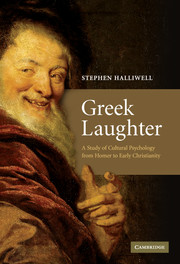Book contents
- Frontmatter
- Contents
- Preface
- Note to the reader
- Abbreviations
- 1 Introduction: Greek laughter in theory and practice
- 2 Inside and outside morality: the laughter of Homeric gods and men
- 3 Sympotic elation and resistance to death
- 4 Ritual laughter and the renewal of life
- 5 Aischrology, shame and Old Comedy
- 6 Greek philosophy and the ethics of ridicule
- 7 Greek laughter and the problem of the absurd
- 8 The intermittencies of laughter in Menander's social world
- 9 Lucian and the laughter of life and death
- 10 Laughter denied, laughter deferred: the antigelastic tendencies of early Christianity
- Appendix 1 The Greek (body) language of laughter and smiles
- Appendix 2 Gelastic faces in visual art
- Bibliography
- Index of selected authors and works
- Index of selected Greek terms
- General index
10 - Laughter denied, laughter deferred: the antigelastic tendencies of early Christianity
Published online by Cambridge University Press: 22 September 2009
- Frontmatter
- Contents
- Preface
- Note to the reader
- Abbreviations
- 1 Introduction: Greek laughter in theory and practice
- 2 Inside and outside morality: the laughter of Homeric gods and men
- 3 Sympotic elation and resistance to death
- 4 Ritual laughter and the renewal of life
- 5 Aischrology, shame and Old Comedy
- 6 Greek philosophy and the ethics of ridicule
- 7 Greek laughter and the problem of the absurd
- 8 The intermittencies of laughter in Menander's social world
- 9 Lucian and the laughter of life and death
- 10 Laughter denied, laughter deferred: the antigelastic tendencies of early Christianity
- Appendix 1 The Greek (body) language of laughter and smiles
- Appendix 2 Gelastic faces in visual art
- Bibliography
- Index of selected authors and works
- Index of selected Greek terms
- General index
Summary
Τοῦ κυϱίου τοὺς νῦν γελῶντας κατακρίνοντος, εὔδηλον ὅτι οὐδέποτε καιρὸς γέλωτός ἐστι τῷ πιστῷ.
(Since our master condemns those who laugh in this life, it is patent that for the believer there is never a right time for laughter.)
Basil of CaesareaΚαὶ γὰρ καὶ αὐτὸς ἐδάκρυσεν. καὶ τοῦτο μὲν πολλάκις ἔστιν ἰδεῖν αὐτὸν ποιοῦντα, γελῶντα δὲ οὐδαμοῦ· ἀλλ´ οὐδὲ μειδιῶντα ἠρέμα· οὐκοῦν τῶν εὐαγγελιστῶν οὐδεὶς εἴρηκε.
(Christ himself wept … We can often observe him doing so, but never laughing – nor even smiling gently: none of the evangelists states that he did so.)
John ChrysostomMOCKING ‘THE KING OF THE JEWS’
It is a fact with deep, long-lasting repercussions that laughter plays a disturbing part in the founding narrative of Christianity. In the account of Jesus' arrest presented in the gospel of Mark, probably the earliest of the synoptics, we are told that after Pilate had released Barabbas and handed over ‘the king of the Jews’ for crucifixion, the governor's soldiers took Jesus inside the praetorium and organised their own humiliation of the supposedly regal prisoner.
… καὶ συγκαλοῦσιν ὅλην τὴν σπεῖραν. καὶ ἐνδιδύσκουσιν αὐτὸν πορφύραν καὶ περιτιθέασιν αὐτῷ πλέξαντες ἀκάνθινον στέφανον· καὶ ἤρξαντο ἀσπάζεσθαι αὐτὶν· χαῖρε, βασιλεῦ τῶν Ἰουδαίων· καὶ ἔτυπτον αὐτοῦ τὴν κεφαλὴν καλάμῳ καὶ ἐνέπτυον αὐτῷ καὶ τιθέντες τὰ γόνατα προσεκύνουν αὐτῷ. καὶ ὅτε ἐνέπαιξαν αὐτῷ, ἐξέδυσαν αὐτὸν τὴν πορφύραν καὶ ἐνέδυσαν αὐτὸν τὰ ἱμάτια αὐτοῦ. καὶ ἐξάγουσιν αὐτὸν ἵνα σταυρώσωσιν αὐτόν. […]
- Type
- Chapter
- Information
- Greek LaughterA Study of Cultural Psychology from Homer to Early Christianity, pp. 471 - 519Publisher: Cambridge University PressPrint publication year: 2008



